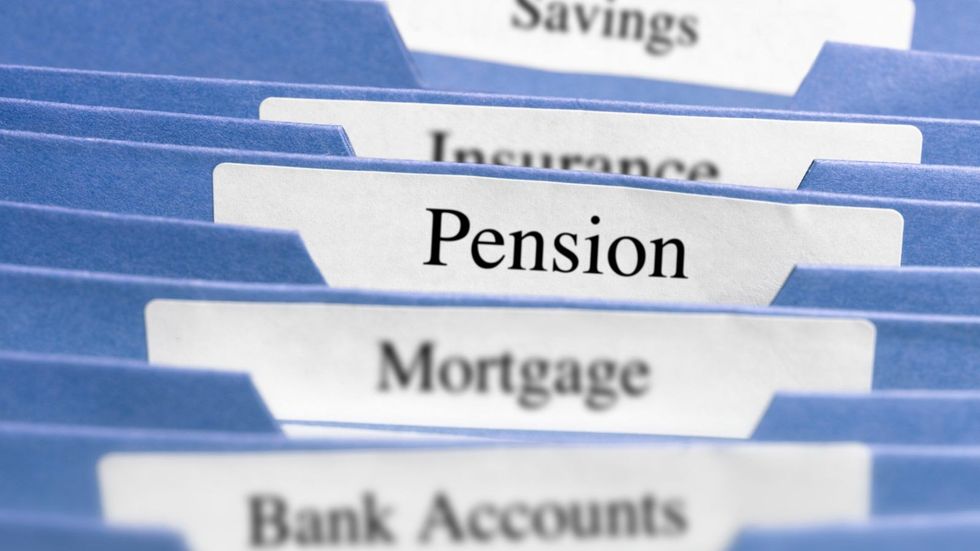Retirement in crisis as over 85s twice as likely to pay tax on their state pension - 'intuitively unfair!'
By April 2027, experts believe most new state pensioners will become taxpayers regardless of any other income
Don't Miss
Most Read
Trending on GB News
Millions of British pensioners are being dragged into the tax net as state pension payments continue to rise.
New figures reveal that older retirees are now far more likely to face income tax bills than their younger counterparts.
Nearly half of Britain’s oldest pensioners are now paying income tax on their state pensions, new figures show.
Around 46 per cent of those aged between 85 and 89 breach the £12,570 tax-free threshold, along with 45 per cent of retirees aged 90 and over.
In comparison, just 22 per cent of pensioners under 85 have been hit with what former prime minister Rishi Sunak once called a "retirement tax."
 Britons' pension pots have not gone far enough during the cost of living crisis GETTY
Britons' pension pots have not gone far enough during the cost of living crisis GETTY Experts have warned that the growing divide risks penalising Britain’s oldest and most vulnerable citizens, with analysis by The Telegraph of Department for Work and Pensions (DWP) data highlighting significant differences across age groups.
Of the roughly 677,000 pensioners aged 90 or over, 307,000 receive more than £12,570 a year — compared with just 336,000 out of 2.77 million pensioners aged 65 to 69, or 12.1 per cent.
Older retirees are also more likely to face heavier tax bills. Around 6.1 per cent of those aged 80 and over pay at least £1,000 in tax on their state pension, compared with only 1.3 per cent of those aged between 65 and 79.
Many pensioners also draw income from private pensions, meaning their overall tax bills are likely to be considerably higher.
Older retirees typically receive larger state pensions because they accrued entitlements under the pre-2016 "old" system. While the "basic" element of the old state pension is currently worth £9,175.40 a year — nearly £3,000 less than the new state pension of £11,973 — many older pensioners boosted their income through the additional earnings-related entitlement known as Serps.

many older pensioners boosted their income through the additional earnings-related entitlement known as Serps
GETTYThe additional earnings-related entitlement of the old state pension, commonly known as Serps, has allowed older retirees to boost their total state pensions beyond the tax-free threshold.
This two-part structure means many elderly pensioners receive significantly more than younger retirees.
Steve Webb, a former pensions minister, now a partner at pension consultants LCP, said: "It is often forgotten that the old state pension was made up of two parts – a largely flat-rate basic pension and an earnings-related pension on top, which could add significantly to the amount you received."
Caroline Abrahams, director of charity Age UK, called it "intuitively unfair" that the very oldest in society should be taxed most on their state pension.
Baroness Altmann, another former pensions minister, warned: "The most elderly may be unable to cope with tax returns leaving them vulnerable to fines or penalties for failing to pay small amounts of tax."
Income tax thresholds have been frozen since 2022 under the Tories and are due to remain so until 2028. At the same time, the state pension "triple lock" has pushed up retirees' weekly payments.
This combination has dragged millions more pensioners into the tax net or higher tax brackets. Around 3.3 million people already receive a state pension above the £12,570 personal allowance.

Income tax thresholds have been frozen since 2022 under the Tories and are due to remain so until 2028
GETTYAbrahams added: "People in this age group are much more likely to be in ill-health and also to find their savings have dwindled over the years, compared to others who have only recently retired."
She urged the Government to increase the personal allowance rather than keeping it frozen. The "triple lock" guarantee is expected to push state pensions even higher in coming years.
Forecasts suggest anyone receiving the new "full" state pension will exceed the £12,570 personal allowance as early as April 2027.
At that point, most new state pensioners will become taxpayers regardless of any other income.
Webb noted: "Those on the new system are mostly under the tax threshold, but this will change dramatically at some point in the next two years when the standard new pension goes over the tax threshold."







